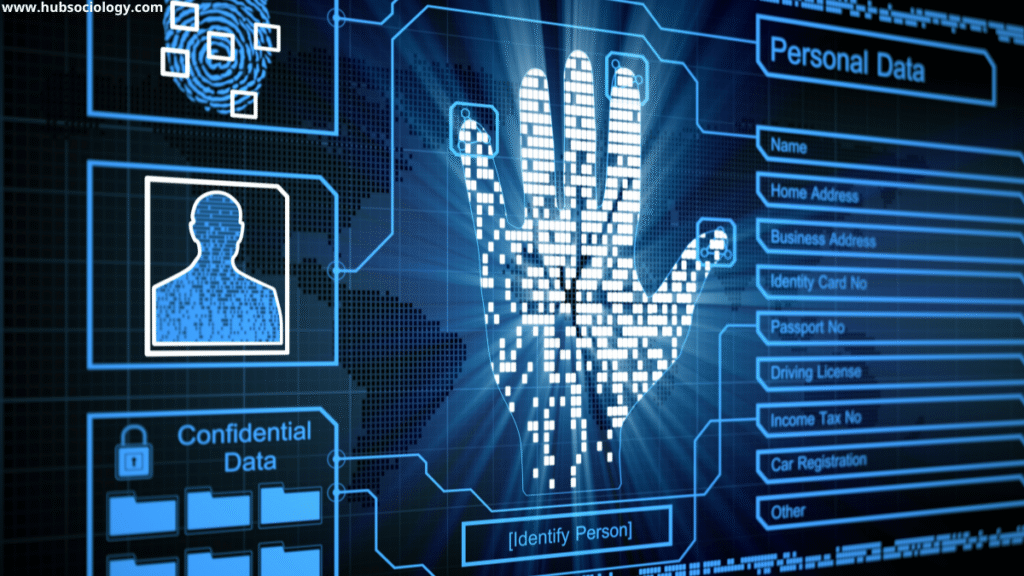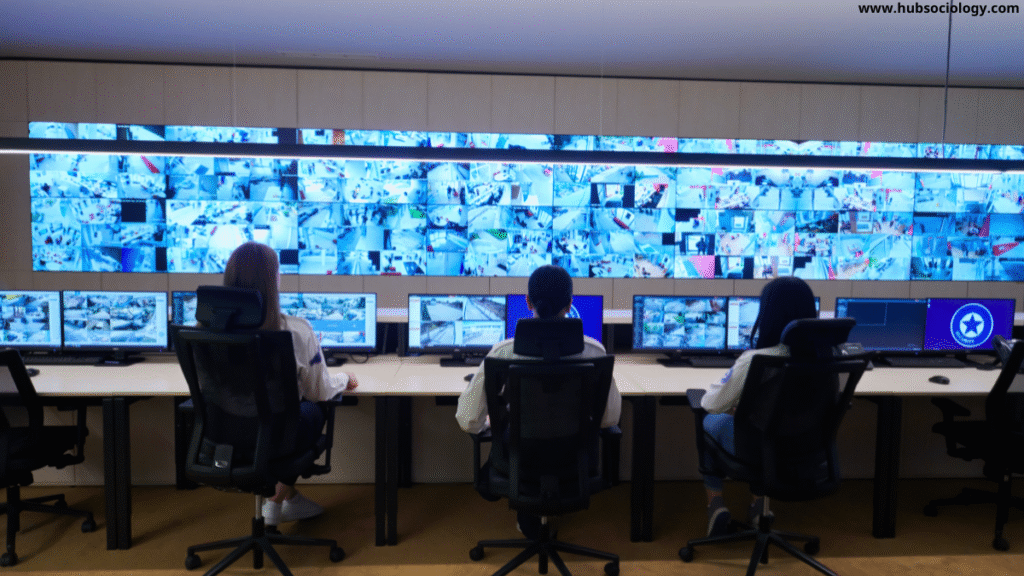Introduction on Data Privacy and Surveillance
In the digital age, data privacy and surveillance have become central concerns in sociological discourse. The rapid expansion of digital technologies, social media platforms, and state surveillance mechanisms has fundamentally altered the ways in which personal information is collected, stored, and utilized. Sociologists examine these developments through various theoretical frameworks, exploring how surveillance affects social behavior, power dynamics, and individual autonomy. This article analyzes data privacy and surveillance from a sociological perspective, focusing on themes such as social control, the panopticon effect, corporate surveillance, and resistance movements.
Table of Contents
The Sociology of Surveillance: Theoretical Foundations

1. Foucault’s Panopticon and Disciplinary Society
Michel Foucault’s concept of the panopticon, derived from Jeremy Bentham’s prison design, provides a foundational framework for understanding modern surveillance. The panopticon symbolizes a structure where individuals modify their behavior under the assumption of being watched, even if surveillance is intermittent.
Foucault argued that modern institutions (schools, hospitals, workplaces) function like panopticons, fostering self-regulation through constant observation. In the age of digitalization, this shows up as:
- Government surveillance (e.g., CCTV, mass data collection by intelligence agencies)
- Corporate tracking (e.g., social media monitoring, algorithmic profiling)
- Workplace surveillance (e.g., employee monitoring software)
The internalization of surveillance leads to a disciplined society where individuals unconsciously conform to expected behaviors, reinforcing existing power structures.
2. Marxian Perspectives: Surveillance Capitalism
Drawing from Marxist theory, scholars like Shoshana Zuboff argue that surveillance capitalism—the commodification of personal data—represents a new form of economic exploitation. Tech corporations (Google, Facebook, Amazon) harvest user data to predict and manipulate behavior for profit.
Key features include:
- Data extraction: Personal behaviors are monetized without consent.
- Behavioral modification: Targeted ads and algorithmic nudges shape consumer choices.
- Asymmetrical power: Corporations and governments gain unprecedented control over populations.
This dynamic exacerbates social inequalities, as marginalized groups often bear the brunt of invasive surveillance (e.g., predictive policing algorithms disproportionately targeting minorities).
3. Giddens and the Surveillance State
Anthony Giddens’ theory of modernity and surveillance highlights how nation-states use surveillance to maintain control. Unlike pre-modern societies, contemporary governance relies on dataveillance—systematic monitoring of digital footprints—to manage populations.
Examples include:
- Biometric identification (e.g., facial recognition, Aadhaar in India)
- Social credit systems (e.g., China’s citizen scoring)
- Anti-terrorism surveillance (e.g., NSA’s PRISM program)
Giddens suggests that while surveillance enhances administrative efficiency, it also erodes trust and fosters a culture of suspicion.
Social Implications of Data Privacy Erosion
1. Chilling Effects on Free Expression
People may self-censor when they are aware that they are being watched in order to prevent negative consequences. Studies show that:
- Journalists and activists avoid sensitive topics due to fear of state retaliation.
- Social media users limit political discussions to evade algorithmic suppression.
This phenomenon aligns with Foucault’s idea of disciplinary power, where surveillance suppresses dissent before it even occurs.
2. Normalization of Surveillance and Social Control
Surveillance is increasingly normalized through:
- Voluntary participation: People willingly share personal data for convenience (e.g., fitness trackers, smart home devices).
- Cultural conditioning: Reality TV and social media promote exhibitionism, making surveillance seem harmless.
This normalization reinforces social control mechanisms, where individuals trade privacy for perceived security or convenience.
3. Differential Surveillance and Social Stratification
Not all groups experience surveillance equally. Marginalized communities—such as racial minorities, immigrants, and political dissidents—face hyper-surveillance:
- Predictive policing disproportionately targets Black and Latino neighborhoods.
- Border surveillance intensifies scrutiny on migrants.
- Workplace monitoring is stricter for low-wage gig workers than corporate employees.
This uneven surveillance perpetuates social hierarchies, reinforcing systemic discrimination.

Resistance and Counter-Surveillance Movements
Despite pervasive surveillance, resistance movements have emerged:
1. Digital Privacy Advocacy
Organizations like the Electronic Frontier Foundation (EFF) and Privacy International campaign for stronger data protection laws (e.g., GDPR in Europe).
2. Encryption and Anonymity Tools
Technologies like Tor, Signal, and VPNs enable individuals to evade tracking, reflecting a tactical resistance to surveillance.
3. Sousveillance (Watching the Watchers)
Activists practice sousveillance—recording authorities to hold them accountable (e.g., filming police brutality).
4. Legal and Policy Reforms
Public pressure has led to regulations like:
- General Data Protection Regulation (GDPR) (EU)
- California Consumer Privacy Act (CCPA) (USA)
However, enforcement remains inconsistent, and corporate lobbying often weakens protections.
Conclusion on Data Privacy and Surveillance
The sociological study of data privacy and surveillance reveals a double-edged sword: while surveillance can enhance security and efficiency, it also entrenches power imbalances and stifles autonomy. Foucault’s panopticon, Marxian critiques of surveillance capitalism, and Giddens’ analysis of the modern state all highlight the structural consequences of unchecked surveillance.
Moving forward, societies must:
- To stop state and corporate overreach, data privacy regulations should be strengthened.
- Promote digital literacy to empower individuals against surveillance.
- Encourage ethical technology design that prioritizes privacy.
Ultimately, the future of data privacy will depend on collective resistance and institutional accountability—ensuring that surveillance serves democratic values rather than undermines them.

Do you like this this Article ? You Can follow as on :-
Facebook – https://www.facebook.com/hubsociology
Whatsapp Channel – https://whatsapp.com/channel/0029Vb6D8vGKWEKpJpu5QP0O
Gmail – hubsociology@gmail.com
Topic Related Questions
5-Mark Questions (Short Answer)
- Define “surveillance capitalism” and give one example.
- How does Foucault’s panopticon theory apply to digital surveillance?
- What is the “chilling effect” in the context of data privacy?
- Name two technologies used for counter-surveillance.
- How does corporate surveillance contribute to social inequality?
- What is differential surveillance? Provide an example.
- How do social credit systems (e.g., in China) reflect modern surveillance?
- What role does GDPR play in protecting data privacy?
- How does workplace surveillance impact employee behavior?
- What is sousveillance, and how does it challenge traditional surveillance?
10-Mark Questions (Brief Essay/Explanation)
- Explain how Michel Foucault’s concept of the panopticon is relevant in today’s digital surveillance society.
- Discuss the impact of mass surveillance on freedom of expression, with examples.
- Analyze how marginalized communities experience surveillance differently than privileged groups.
- Compare and contrast state surveillance and corporate surveillance in terms of objectives and societal impact.
- How does Shoshana Zuboff’s theory of “surveillance capitalism” explain the exploitation of personal data?
- Evaluate the effectiveness of encryption tools (e.g., VPNs, Signal) in resisting surveillance.
- Discuss the ethical implications of facial recognition technology in public spaces.
- How has social media normalized self-surveillance and data commodification?
- Explain Anthony Giddens’ perspective on the relationship between modernity and surveillance.
- What are the key provisions of GDPR, and how do they attempt to protect user privacy?
15-Mark Questions (Long Essay/Critical Analysis)
- Critically examine the role of surveillance in modern society using Foucault’s panopticon and Zuboff’s surveillance capitalism theories.
- “Privacy is a myth in the digital age.” Discuss this statement with reference to corporate and state surveillance.
- How does surveillance reinforce social inequalities? Provide examples from policing, workplace monitoring, and border control.
- Analyze the effectiveness of legal frameworks (e.g., GDPR, CCPA) in protecting data privacy in an era of mass surveillance.
- Discuss the psychological and social consequences of living in a surveillance society. Refer to self-censorship, trust, and conformity.
- Evaluate the role of counter-surveillance movements (e.g., encryption, sousveillance) in resisting state and corporate monitoring.
- How has the normalization of surveillance through social media and smart devices changed societal perceptions of privacy?
- Compare the surveillance mechanisms in democratic and authoritarian states. How do they differ in intent and public reception?
- Can data privacy coexist with national security concerns? Debate with sociological perspectives.
- “Surveillance is not just about control but also about profit.” Critically analyze this statement in the context of big tech companies.
